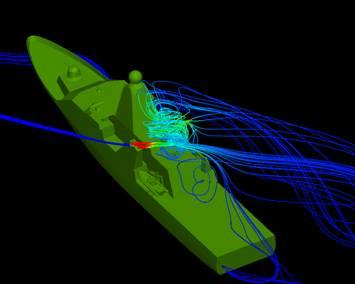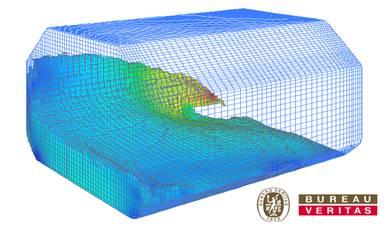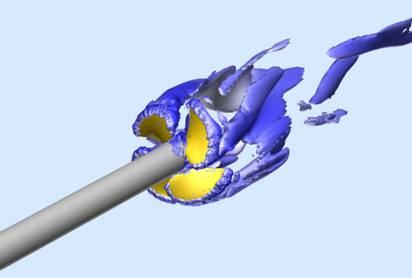Open Source CFD Assessment for Research
The goal of the CRS OSCAR (Open Source CFD Assessment for Research) is to objectively evaluate the open source CFD (computational fluid dynamics) code OpenFOAM for use on marine hydrodynamics type problems. CFD is a powerful engineering and research analysis tool for fluid dynamics problems that has traditionally been provided by commercial vendors with costly annual licence fees. Open source software not only has the advantage of being free to use, but also allows users full access to the source code which can be modified or extended to better suit specific applications. This working group will perform a series of tasks to evaluate OpenFOAM for various marine hydrodynamics type problems against existing model or full scale data and results from other CFD codes.
Backgrounds
Currently many CRS members and nearly all CRS working groups use computational fluid dynamics (CFD) software. CFD can be used to simulate complicated fluid flows and is becoming an invaluable tool for both research and routine engineering analyses. Most CFD used in industry is commercial proprietary software that often comes with a hefty price tag. This is usually in the form of an annual license fee that is often also a function of the physical computing power being used (e.g. price increases with increasing number of processors used). This has the effect of amplifying the cost of large scale, detailed simulations that require extensive parallelization across many processors. Commercial CFD software can also have limited compatibility with other brands of CFD, making collaborative projects more difficult.
There is an alternative: Open Source CFD. Open source software is playing an increasingly important role in modern computing. Open source is a collaborative approach to software development and results in a free to use, free to modify end product.
OpenFOAM® (Open Field Operation and Manipulation) CFD Toolbox is an open source CFD package produced by the commercial company OpenCFD Ltd. located in the U.K. Its business model is based on code development, training, and technical support. Companies that require specific capabilities not already present in the code, such as a particular turbulence model, or a new meshing strategy, can contract OpenCFD Ltd. to develop these capabilities. They also charge to provide technical support services to clients, and for training courses and material. However, they do not charge anyone to use the software.
Developments made by contract to OpenCFD Ltd. will be made public as part of the OpenFOAM software and be subject to the GNU General Public License (http://www.gnu.org/licenses/gpl.html) or GPL. However, the GPL does not require private modifications or developments to be made publicly available. This means OpenFOAM can be used as the basis of in-house, proprietary software.
The benefits of a free Open Source code have meant that some CRS members have already starting using OpenFoam. The objective of this project is to evaluate the usefulness of this software for the type of hydrodynamic problems that CRS is interested in. It is proposed to carry out a study to thoroughly evaluate the code on a few selected problems. Aspects in the evaluation include user-friendliness of the meshing program and solver, accuracy of the calculations, accuracy of the results, comparison of results to other CFD codes and experimental results.
If these results are positive, the CRS could collectively use a free CFD code as workhorse for viscous and inertial flow calculations. The shared knowledge and developments are aspects that will benefit the whole CRS community.

Objectives
The proposed CRS-OSCAR project will evaluate the capabilities of OpenFOAM for marine hydrodynamics. The tasks of the project will be to:
1. Identify a set of hydrodynamic problem types of interest to CRS members and select from this set three cases for this study.
2. If required, develop missing capabilities.
3. Carry out a verification study for the selected cases.
4. Validate OpenFOAM for these problem types by comparing the results to other CFD programs and to experimental data.
5. Develop training material.

Expected results
The deliverables from this project (aside from task and annual reports) will be an evaluation of OpenFOAM for hydrodynamic problems of interest to CRS members. The evaluation comprises an assessment of the accuracy of the code, a comparison to results obtained with other CFD codes and a comparison to experimental results. The project will also produce guidance, training, and tutorials aimed at quickly building up expertise of CRS members in the use of OpenFOAM.
It is possible that the OpenFOAM code will have been improved due to this project, allowing it to better solve marine hydrodynamics problems. These are improvements that may not have otherwise been implemented. A better OpenFOAM code might therefore also be a deliverable of this project.

